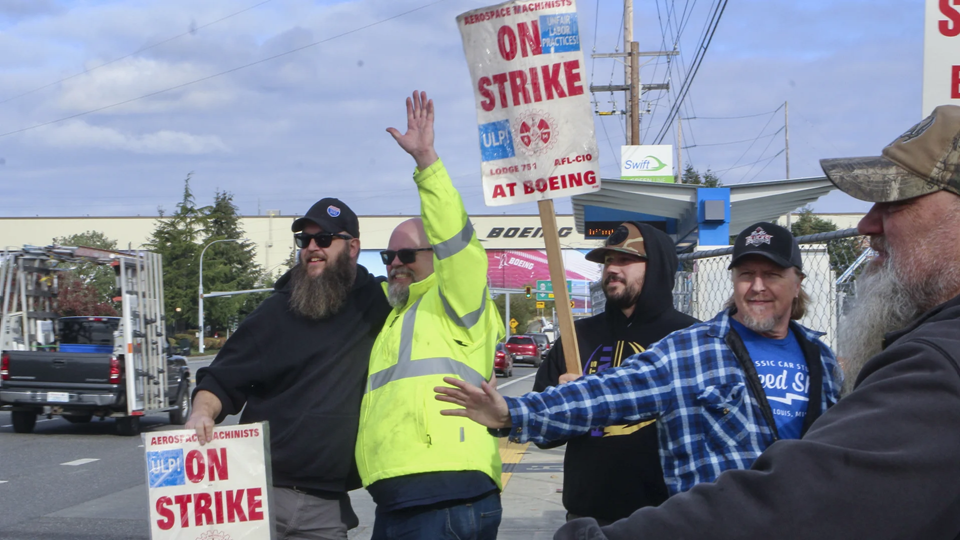Boeing reports $6 billion quarterly loss amid a crippling strike
CEO Kelly Ortberg said Boeing needs ‘a fundamental culture change in the company.’
Boeing reported a loss of more than $6 billion in the third quarter and immediately turned its attention to union workers who will vote Wednesday whether to accept a company contract offer or continue their crippling strike, which has dragged on for nearly six weeks.
New CEO Kelly Ortberg laid out his plan to turn Boeing around after years of heavy losses and damage to its reputation.
In remarks he planned to deliver later Wednesday to investors, Ortberg said Boeing needs “a fundamental culture change in the company.” To accomplish that, he said, company leaders need to spend more time on factory floors to know what is going on and “prevent the festering of issues and work better together to identify, fix, and understand root cause.”
Ortberg repeated that he wants to “reset” management’s relationship with labor “so we don’t become so disconnected in the future.” He expressed hope that machinists will vote to approve the company’s latest contract offer and end their strike.
“It will take time to return Boeing to its former legacy, but with the right focus and culture, we can be an iconic company and aerospace leader once again,” he said.
The strike is an early test for Ortberg, a Boeing outsider who became CEO in August.
Ortberg has already announced large-scale layoffs and a plan to raise enough cash to avoid a bankruptcy filing. He needs to convince federal regulators that Boeing is fixing its safety culture and is ready to boost production of the 737 Max — a crucial step to bring in much-needed cash.
Boeing can’t produce any new 737s, however, until it ends the strike by 33,000 machinists that has shut down assembly plants in the Seattle area.
Ortberg has “got a lot on his plate, but he probably is laser-focused on getting this negotiation completed. That’s the closest alligator to the boat,” said Tony Bancroft, portfolio manager at Gabelli Funds, a Boeing investor.
Boeing said Wednesday that it lost $6.17 billion in the period ended Sept. 30, with an adjusted loss of $10.44 per share. Analysts polled by Zacks Investment Research were calling for a loss of $10.34 per share.
Revenue totaled $17.84 billion, matching Wall Street estimates.
Shares were flat before the opening bell.
Boeing hasn’t had a profitable year since 2018, and Wednesday’s numbers represent the second-worst quarter in Boeing’s history. The long-profitable company’s fortunes soured after two of its 737 Max jetliners crashed in October 2018 and March 2019, killing 346 people. Safety concerns were renewed when a panel blew off a Max during an Alaska Airlines flight in January.

Ortberg said Boeing is at a crossroads.
“The trust in our company has eroded. We’re saddled with too much debt. We’ve had serious lapses in our performance across the company, which have disappointed many of our customers,” the new CEO said. But he also highlighted the company’s strengths, including a backlog of airplane orders valued at a half-trillion dollars.
Investors were looking for Ortberg to project calm, determination and urgency when he presides over an earnings call for the first time since he ran Rockwell Collins, a maker of avionics and flight controls for airline and military planes, in the last decade.
The biggest news of the day, however, is likely to come Wednesday evening, when the International Association of Machinists and Aerospace Workers reveals whether striking workers are ready to go back to their jobs.
They will vote at union halls in the Seattle area and elsewhere on a Boeing offer that includes pay raises of 35% over four years, $7,000 ratification bonuses, and the retention of performance bonuses that Boeing wanted to eliminate.
Boeing has held firm in resisting a union demand to restore the traditional pension plan that was frozen a decade ago. However, older workers would get a slight increase in their monthly pension payouts.
At a picket line outside Boeing’s factory in Everett, Washington, some machinists encouraged colleagues to vote no.
“The pension should have been the top priority. We all said that was our top priority, along with wage,” said Larry Best, a customer-quality coordinator with 38 years at Boeing. “Now is the prime opportunity in a prime time to get our pension back, and we all need to stay out and dig our heels in.”
Best also thinks the pay increase should be 40% over three years to offset a long stretch of stagnant wages, now combined with high inflation.
“You can see we got a great turnout today. I’m pretty sure that they don’t like the contract because that’s why I’m here,” said another picketer, Bartley Stokes Sr., who started working at Boeing in 1978. “We’re out here in force, and we’re going to show our solidarity and stick with our union brothers and sisters and vote this thing down because they can do better.”
—David Koenig and Manuel Valdes, Associated Press
(3)
Report Post





